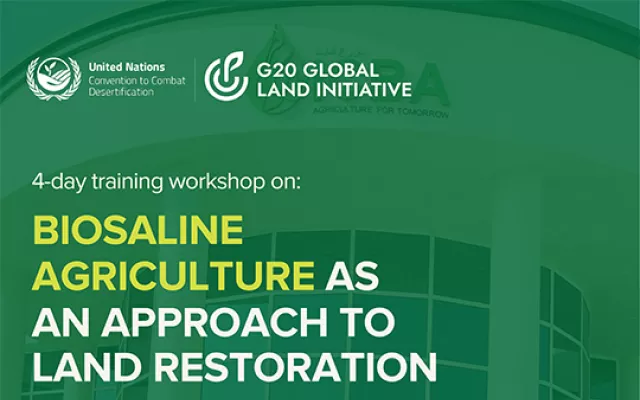ICBA to support salinity management in Palestine
9 December 2015
As part of its continued efforts to boost food and water security in the Middle East through collaborative initiatives, the International Center for Biosaline Agriculture (ICBA) has concluded a new cooperation agreement with the Palestinian National Agricultural Research Center (NARC).
The agreement is expected to give a renewed impetus to research collaboration between ICBA and NARC in a number of areas.
During a ceremony at the ICBA head office in Dubai, UAE, on December 9, 2015, Dr. Ismahane Elouafi, ICBA’s Director General, and Dr. Soufian Sultan, Palestine’s Minister of Agriculture, signed the memorandum of understanding to support agricultural research, management of marginal water resources, and improve the livelihoods of rural communities in the West Bank and Gaza Strip.
Speaking of the positive impact of this cooperation and ICBA’s contribution over the years to fighting salinity, Dr. Sultan said: “Saline areas in Palestine stretch over 30,000 ha. The major problem here is the salinity of surface and ground water that we rely on for irrigation purposes. Therefore, we need solutions for the salinity problem to grow new salt-tolerant varieties. ICBA has great expertise in salinity management and we aim to duplicate some of the successful trials in Palestine.”
According to the agreed technical program, ICBA will provide technology-based solutions to tackle soil erosion, soil and water salinity, water scarcity, desertification, and climate change in Palestine.
Dr. Elouafi said: "We are pleased to continue our support to the agricultural sector in Palestine and help small-scale farmers increase their production. This time we will be working together with local researchers to promote the use of marginal water and best-bet salt-tolerant varieties that grow in marginal environments. Our scientists have been studying these issues for years and have ready-to-use outcomes to support Palestine's agriculture agenda.”
Both centers will establish a shared database that would benefit future research. Furthermore, a joint research team will approach potential donors with research programs on the management of marginal land and water and will promote their work through regional and international research networks.










